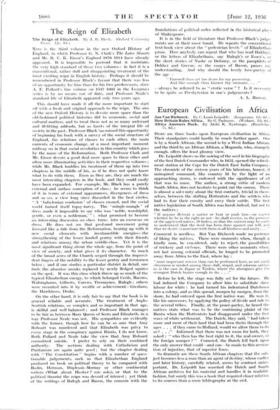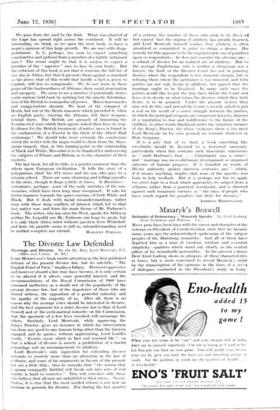European Civilisation in Africa
Jan Van Riebeeck. By C. Louis Leipoldt. (Longman. Its. 6(1.). How Britain Rules Africa. By G. Padmore. (Wishart. Its. tkl.) Africa Answers Back. By Akiki K. Nyabongo. (Routledge. 7s. 6d.) HERE are three books upon European civilisation in Africa. Their standpoints could hardly be much further apart. One is by a South African, the second is by a West Indian African, and the third by an African African, a Muganda, who, strangely
enough, offers the least gloomy view.
Dr. Leipoldt shows us the sowing of the seed in his biography of the first Dutch Commander who, in 1652, opened the refresh- ment station at the Cape for the Dutch East India Company. The chronicle of the sixteen years of his laborious, honest, if uninspired command, like country lit by the light of an
approaching storm, is endowed with the significance of all that was to come. The author, a strong critic of modern South Africa, does not hesitate to point out the omens. There is almost a soler linty about the first contacts, trivial in them- selves, between the shifting Hottentots and the settlers who had to fear their enmity and envy their cattle. The first native legislation of South Africa was harsh indeed, but not to the natives :
" If anyone ill-treat a native or beat or push him—no matter whether ho be in the right or not—he shall receive, in the presence of the aggrieved native, 50 lashes, so that the natives may be made to understand that the deed has been done against our will, and that we desire 1/) associate with them in all kindness and amity.. .."
Comment is needless. But Van Riebeeck made no pretence of liking the natives. There were moments when, though► a kindly man, he considered, only to reject, the possibilities of trickery and vio7enee. There were other moments when, not last among colonial officials, he longed to be promoted away from Africa to the East, where lay :
" more important service than can be performed here, as not much cleverness is needed among these dull, stupid, and odorous natives as is the case in Japan or Tonkin, where the aborigines give the strongest Dutch brains enough to do. . . ."
Before he left, the stage was fully set for the future. He
had induced the Company to allow him to substitute slave labour for white : he had turned his indentured Dutchmen into a colony, and as this spread, morgen by morgen, from the
shore, he had entered upon the first native war. He won it, like his successors, by applying the policy of divide and rule to the several tribes. Finally, at the. peace-parley, he heard the
natives state what was to be the continuing plaint of the Bantu when the Hottentots had disappeared under the first wave of white settlement. The Dutch, they said, "had taken more and more of their land that had been theirs through the ages . . . if they came to Holland, would we allow them to do so ? . . ." Informed that there was not room for, both, they asked : " who then has the best right to it, the real owner, or the foreign usurper ? " Cornered, the Dutch fell back upon the only answer that could—and can—be made to this accusa- tion of injustice, that of superior force.
So dramatic are these South African chapters that the sub- ject becomes less a man than an agent of destiny, whose earlier and later history, carefully related, seems by contrast unim- portant. Dr. Leipoldt has searched the Dutch and South African archives for his material and handles it in readable fashion, but surely this was a book that required closer relation to its sources than a mere bibliography at the end. We pass from the seed to the fruit. What was planted at the Cape has spread right across the continent. It will be
interesting, we think, as we open the next book, to have a negro's opinion of this large growth. We are met with disap- pointment. Is it, perhaps, too soon to expect something constructive and judicial from a member of a rightly indignant race ? The retort might be that it is useless to expect a member of the " superior " race to face its own faults. But the criticism of this book is not that it contains the full list of our sins in Africa, but that it presents them against a standard so far above that of this world that hardly a fact is given to explain, still less to compensate. We do not learn in these pages of the backwardness of Africans, their social atomisation and savagery. We seem to see a number of potentially demo- cratic nations held back by nothing but the greedy determina- tion of the British to monopolise all power. Minor inaccuracies and exaggerations abound. We hear of the conquest of Benin; but not of the Benin-massacre which preceded it, when an English party, trusting the Africans, left their weapons behind them. The British are accused . of fomenting the Yoruba civil wars which their agents risked their lives to stop. Evidence for the British treatment of native races is found in the exclamationof a Fascist in the thick .of the Albert Hall scrimmage ! We should take more seriously the conclusions which the writer tells the negro world to draw from the Abys- sinian tragedy, that, at this turning-point in the relationship of Meek and White, Mussolini is to be thanked for undeceiving the subjects of Fiance and Britain as to the, character of their masters.
The laSt book, for all its title, is a gentler comment than the others Upon Eurojwan civilisation. It tells the story of a polygamous chief, his 374 wives and his son who goes to a mission school. There are some charming and telling episodes in the story, though it drags a little at times. It illustrates— caricatures, perhaps—some of the early mistakes of the mis- sionaries, which have been long since recognised. It asks for better manners towards the queer customs of both White and Black. But it deals with racial. misunderstandings, rather than With those deep conflicts of interest which led to that first native war, and form the main theme of Mr. Padmores book. The writer, who has seen the West, speaks for Africa as neither Dr. Leipoldt nor Mr. Padmore can hope to speak, but it is only black Africa ruled without question from Whitehall, and here, his parable seems to _tell us, misunderstanding need
be neither complete nor eternal.
..ARGERY PERHAM.























































 Previous page
Previous page